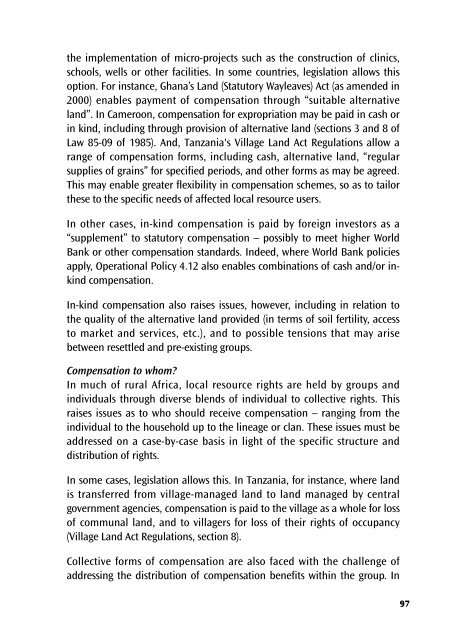Legal empowerment for local resource control
Legal empowerment for local resource control
Legal empowerment for local resource control
Create successful ePaper yourself
Turn your PDF publications into a flip-book with our unique Google optimized e-Paper software.
the implementation of micro-projects such as the construction of clinics,<br />
schools, wells or other facilities. In some countries, legislation allows this<br />
option. For instance, Ghana’s Land (Statutory Wayleaves) Act (as amended in<br />
2000) enables payment of compensation through “suitable alternative<br />
land”. In Cameroon, compensation <strong>for</strong> expropriation may be paid in cash or<br />
in kind, including through provision of alternative land (sections 3 and 8 of<br />
Law 85-09 of 1985). And, Tanzania's Village Land Act Regulations allow a<br />
range of compensation <strong>for</strong>ms, including cash, alternative land, “regular<br />
supplies of grains” <strong>for</strong> specified periods, and other <strong>for</strong>ms as may be agreed.<br />
This may enable greater flexibility in compensation schemes, so as to tailor<br />
these to the specific needs of affected <strong>local</strong> <strong>resource</strong> users.<br />
In other cases, in-kind compensation is paid by <strong>for</strong>eign investors as a<br />
“supplement” to statutory compensation – possibly to meet higher World<br />
Bank or other compensation standards. Indeed, where World Bank policies<br />
apply, Operational Policy 4.12 also enables combinations of cash and/or inkind<br />
compensation.<br />
In-kind compensation also raises issues, however, including in relation to<br />
the quality of the alternative land provided (in terms of soil fertility, access<br />
to market and services, etc.), and to possible tensions that may arise<br />
between resettled and pre-existing groups.<br />
Compensation to whom?<br />
In much of rural Africa, <strong>local</strong> <strong>resource</strong> rights are held by groups and<br />
individuals through diverse blends of individual to collective rights. This<br />
raises issues as to who should receive compensation – ranging from the<br />
individual to the household up to the lineage or clan. These issues must be<br />
addressed on a case-by-case basis in light of the specific structure and<br />
distribution of rights.<br />
In some cases, legislation allows this. In Tanzania, <strong>for</strong> instance, where land<br />
is transferred from village-managed land to land managed by central<br />
government agencies, compensation is paid to the village as a whole <strong>for</strong> loss<br />
of communal land, and to villagers <strong>for</strong> loss of their rights of occupancy<br />
(Village Land Act Regulations, section 8).<br />
Collective <strong>for</strong>ms of compensation are also faced with the challenge of<br />
addressing the distribution of compensation benefits within the group. In<br />
97

















